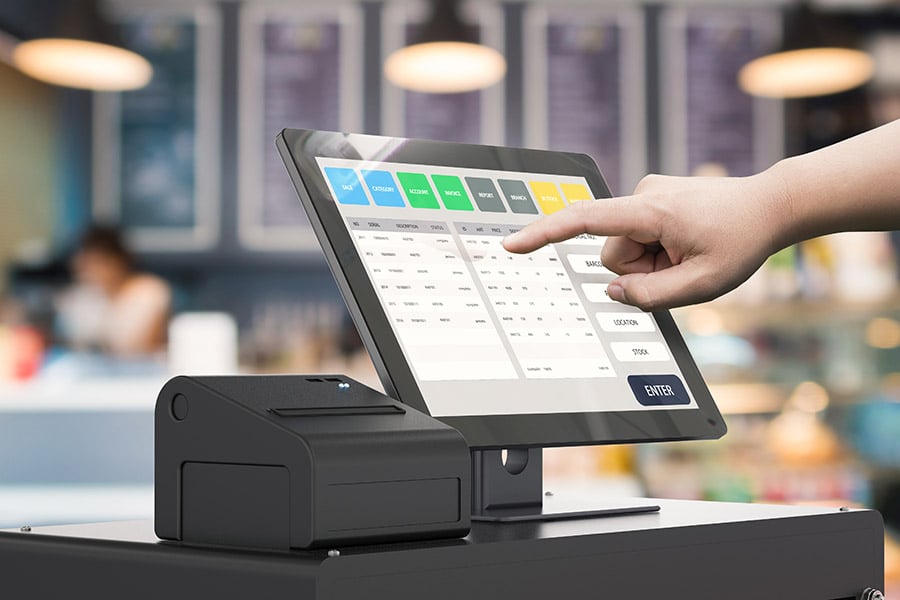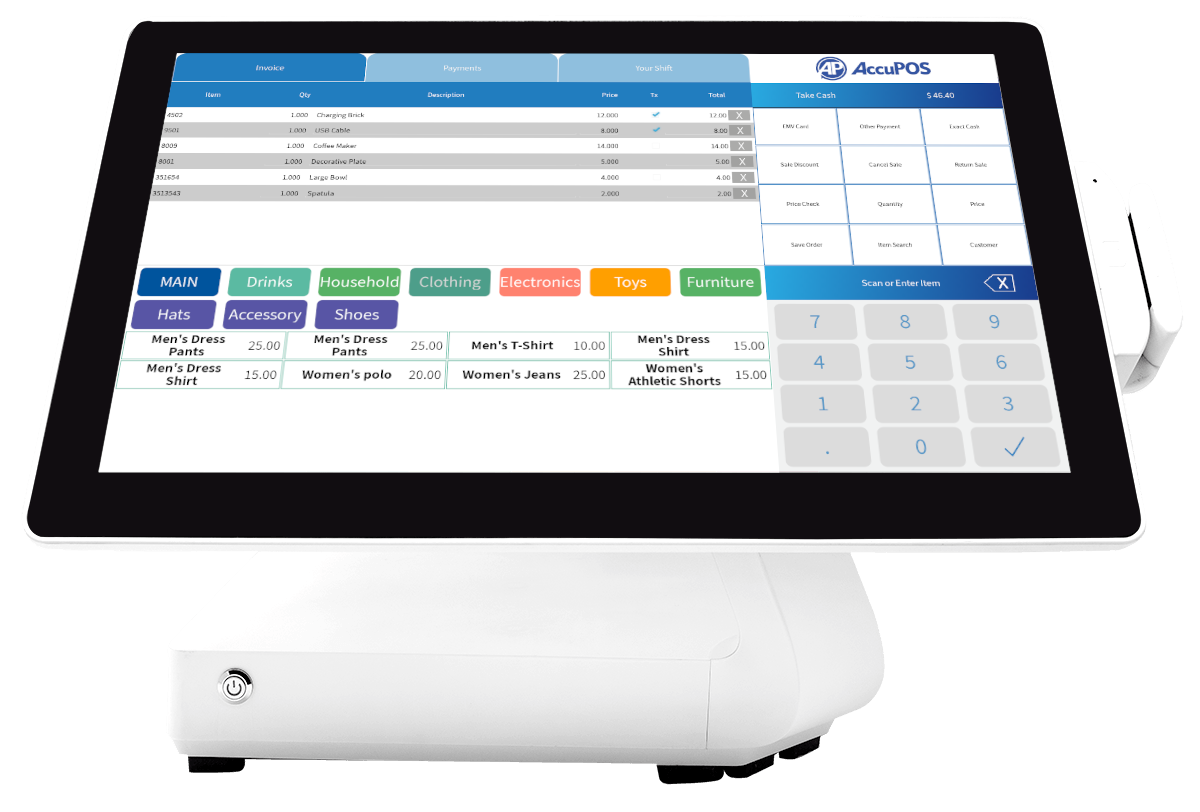Some Known Factual Statements About Point Of Sale
Some Known Factual Statements About Point Of Sale
Blog Article
The Best Strategy To Use For Pos Systems

POS Systems: Retail Point-Of-Sale Solutions Streamline Deals
The Of Pos Systems

Hardware Components of a Point of Sale System What makes a POS system tick? It's not just software application; the hardware plays a starring role. Think about it as the body to the software application's brain. Without the ideal hardware, get more info even the most sophisticated POS software is just a pretty face. Important POS Hardware So, what are the must-haves? Let's break it down. The main processing system, typically a computer system or tablet, is the heart of the operation. The screen or touchscreen show enables personnel to communicate with the system. A barcode scanner accelerate the checkout process. Remember the days of by hand going into each code? The trusty receipt printer offers clients with a record of their purchase. A money drawer keeps your cash safe and arranged. A card reader allows customers to pay with credit or debit cards. Diving Deeper: Beyond the Fundamentals However wait, there's more! Depending upon your company, you might require specialized hardware. A dining establishment might incorporate kitchen area printers to relay orders, while a retail store might utilize label printers for product tagging. Ever wonder how your local bakeshop immediately prints those delicious-looking labels? Choosing the Right Hardware: A Balancing Act Choosing the best hardware isn't almost buying the most costly equipment. It's about finding the sweet spot between functionality, toughness, and spending plan. A small company just starting might go with a more basic setup, while a high-volume retailer will need robust, high-performance devices. Is it much better to buy new or used? Consider your options thoroughly. A brand-new system uses the current innovation and warranty defense, however a refurbished system can conserve you money. The Future of POS Hardware What does the future hold? Expect to see a lot more integration with mobile phones, biometric scanners for staff member authentication, and advanced analytics control panels showed on larger, clearer screens. Picture a world where stock is automatically upgraded in real-time as products are scanned-- a world where you can track your best-selling item from anywhere in the world. The possibilities are limitless, and the hardware is continually developing to fulfill the demands of today's services. Are you ready to upgrade your point of sale system?
Software Characteristics and Capabilities: The Heart of Your POS System
Ever see a seasoned barista glide through a busy morning rush? Their secret isn't simply caffeine; it's a seamless dance with their POS system. The software is the conductor of your service symphony, managing everything from sales to inventory. What notes should you be listening for? What abilities genuinely matter in today's market?
Inventory Management: Beyond Counting Beans
Forget spreadsheets that haunt your dreams. Modern POS systems provide real-time stock tracking, alerting you when your stock of artisanal coffee beans dips precariously low. Think about it as a digital guardian angel, avoiding those uncomfortable "Sorry, we're out!" moments to customers. What if you could also anticipate demand based upon historic information? Lots of systems now provide forecasting tools, an effective weapon against overstocking and lost sales. This assists prevent the situation of running out of popular items or accumulating excess inventory of slow-moving items, both of which can constrain cash circulation and area.
Sales Reporting and Analytics: Translating the Information
Sales information is the new gold, and your POS system is the miner. Forget just understanding just how much you offered today. Dive deep into the data to uncover patterns, recognize your very popular products, and comprehend consumer habits. Which menu product pairs perfectly with the daily special? Which promotion resonated most with your customers? These insights are not simply intriguing; they're actionable intelligence. Without trustworthy sales reporting, navigating the intricacies of company decision-making becomes like sailing without a compass, increasing the opportunity of missteps and missed out on opportunities.
Consumer Relationship Management (CRM): Structure Bridges, Not Walls
Keeping in mind a regular client's name and favorite order is charming, however scaling that personal touch is tricky. POS systems with CRM capabilities permit you to track client purchase history, preferences, and even birthdays. Envision automatically offering a discount on their birthday-- a little gesture that cultivates commitment and motivates repeat company. However there is the potential snag of bad information quality, which can cause unreliable client profiles and ineffective marketing efforts.
Payment Processing: Simplifying the Transaction
The checkout experience can make or break a sale. Smooth combination with different payment techniques-- credit cards, mobile wallets, even copyright-- is non-negotiable. Can your system handle split payments? Does it use secure tokenization to safeguard client data? A cumbersome payment process resembles hitting a sour note in your organization symphony, potentially interfering with the whole efficiency. Ensuring compatibility with developing payment technologies and adherence to security standards are vital for preserving consumer trust and functional efficiency.
Staff Member Management: Keeping the Group in Sync
From clocking in and out to managing consents and tracking efficiency, employee management includes simplify operations and enhance responsibility. Is scheduling a nightmare? Numerous POS systems provide integrated scheduling tools, enhancing staffing levels based on forecasted need. A typical obstacle that is often overlooked is the challenge of integrating staff member management functionalities with payroll systems, which can lead to errors and inefficiencies in wage calculations.
Advanced Features: Leveling Up Your Operations
- Table Management: Perfect for restaurants, this function permits you to envision your dining room, track table status, and manage bookings.
- Loyalty Programs: Reward your best clients and motivate repeat service with incorporated commitment programs.
- Online Purchasing Integration: Perfectly integrate your POS system with online purchasing platforms to broaden your reach.
Picking the ideal POS system is about more than just functionality; it has to do with discovering a partner that can grow with your organization. Consider your existing requirements, expect future growth, and do not hesitate to ask the hard concerns. The right software can change your service from a disorderly cacophony into an unified masterpiece.
Industry-Specific POS System Applications
Consider the regional bakeshop, busy with morning clients craving fresh croissants. A generic POS system might deal with transactions, but can it manage complicated recipes, track active ingredient stock, or automatically adjust production schedules based upon sales information? Probably not. That is where the appeal of industry-specific POS systems shines.
Restaurants and Hospitality
For busy dining establishments, speed and accuracy are vital. The number of times have you seen servers juggling orders, modifications, and splitting costs, all while trying to offer excellent service? A dining establishment POS system improves these procedures, enabling for table management, cooking area order tickets, and even online buying integration. These systems often consist of functions like ingredient-level stock tracking, crucial for managing food expenses and reducing waste. Ever wonder why your favorite dish is often not available? It might originate from an absence of appropriate stock management.
- Table Management
- Cooking Area Order Tickets
- Online Purchasing Combination
- Ingredient-Level Stock Tracking
Retail Solutions
Retail, with its varied stock and consumer interactions, demands a various set of tools. Imagine a boutique clothing store struggling to keep an eye on sizes, colors, and seasonal collections using a basic checkout system. An industry-specific retail POS system uses functions like barcode scanning, client commitment programs, and detailed sales reporting. These systems can even integrate with e-commerce platforms, providing a smooth omnichannel experience for consumers. Did you understand some retail POS systems can forecast future sales trends based upon historic information? Now that is powerful!
The Perils of an Inequality
Choosing the wrong POS system can produce considerable functional difficulties. A clothing boutique using a dining establishment POS, for instance, would discover it inappropriate for handling inventory with sizes and colors. The lack of appropriate reporting and analytics could lead to mistaken getting decisions and lost revenue. The result might be similar to trying to fit a square peg in a round hole.
Key Factors to consider
Selecting an industry-specific POS system needs cautious evaluation. Think of your service's unique requirements and operational workflows. Does the system integrate with existing software application? Does it provide the essential reporting abilities? Is it scalable to accommodate future growth? A well-chosen POS system is not just a transaction tool; it's a strategic asset that can drive efficiency, improve customer satisfaction, and eventually, improve your bottom line. Keep in mind, it is a financial investment in your service's future, not simply a cost.
Security Considerations for Point of Sale Systems
Ever heard the tale of the mom-and-pop store that lost everything due to the fact that of a single, ignored security flaw in their POS system!.?. !? It's a cautionary tale, and it highlights a critical element often eclipsed by the allure of expensive features and streamlined operations. The reality is, a POS system is only as excellent as its security. What great is a system that crunches numbers in a flash if it permits lawbreakers to swipe client's data simply as quickly?
The Vulnerability Minefield
The digital landscape is a battlefield. Every POS system, despite size or elegance, is a possible target. Are you really got ready for the risks hiding around the corner? The genuine pinch comes when you discover that your outdated software has a gaping hole that hackers can exploit, turning your company into an unwitting accomplice in identity theft. The trouble is that hackers are crafty and are always changing their methods.
Typical Security Gaps and Specialist Tips
- Weak Passwords: "Password123" isn't sufficing. Use strong, unique passwords for all POS system accounts and alter them regularly. Two-factor authentication is a must.
- Unsecured Networks: Your Wi-Fi is like leaving the front door open. Protect your network with strong file encryption (WPA3 if possible) and consider a separate network for your POS system.
- Out-of-date Software Application: Software vendors spot security holes all the time. Stopping working to upgrade resembles welcoming problem. Set up automatic updates or schedule regular maintenance.
- Worker Training: Your staff is your very first line of defense. Train them to acknowledge phishing efforts, secure passwords, and report suspicious activity.
Data File Encryption: Your Shield Against the Dark Arts
Consider data file encryption as a secret code. It scrambles sensitive details, like credit card numbers, making it unreadable to unapproved users. Without file encryption, your customers' financial information resemble sitting ducks, ripe for the selecting by cybercriminals. It's not practically securing your customers; it has to do with securing your track record and preventing large fines.
PCI Compliance: The Rulebook You Can't Overlook
If you accept credit cards, you're bound by the Payment Card Market Data Security Standard (PCI DSS) It's a set of security requirements created to safeguard cardholder information. Stopping working to comply can result in fines, penalties, and even the loss of your ability to process charge card payments. It's a headache, yes, however it's a necessary one. Think about PCI compliance as the expense of doing company in the digital age.
Consider this: every deal processed through your point of sale is a potential entry point for destructive actors. By implementing robust security procedures, you're not simply protecting your organization; you're securing your customers' trust and making sure the long-term viability of your operations. The security of your POS system isn't just a technical problem; it's a service imperative. It needs constant alertness, proactive steps, and a commitment to remaining ahead of the curve.